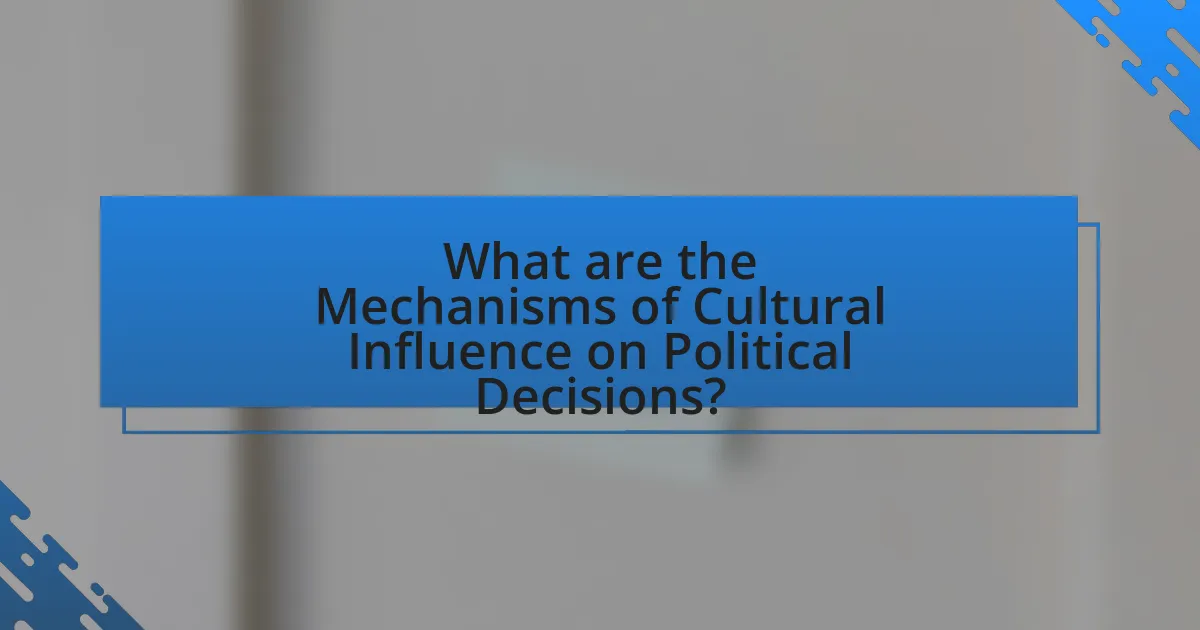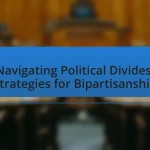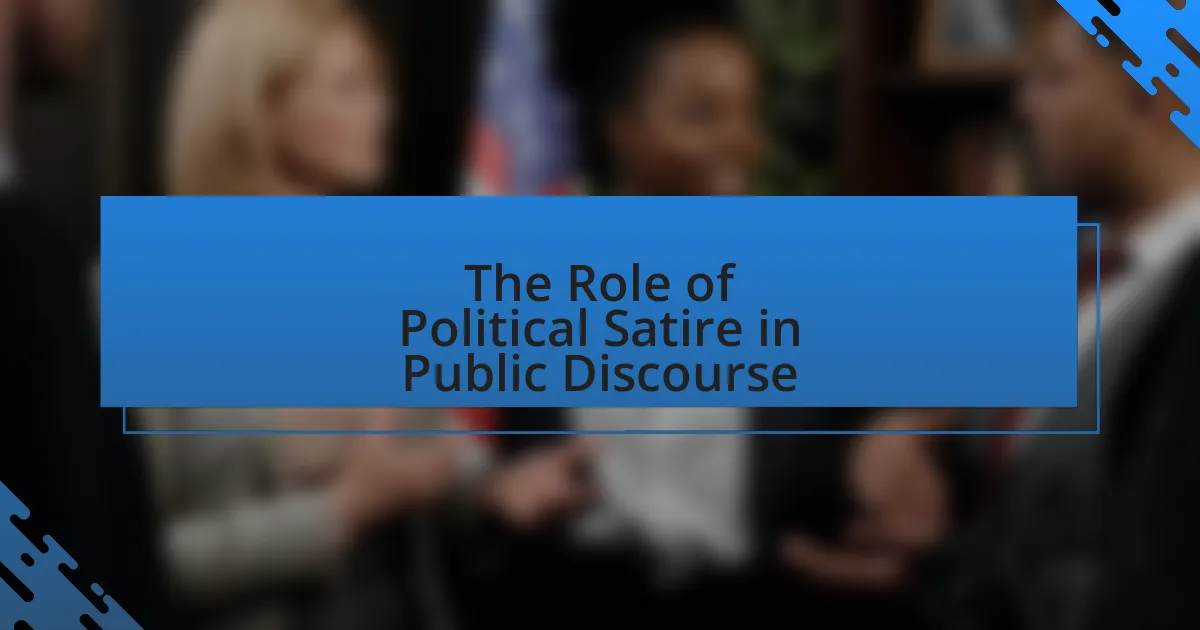Cultural factors encompass the shared beliefs, values, norms, and practices that shape individual and collective behaviors within a society, significantly influencing political decision-making. This article explores how cultural elements such as religion, family traditions, and social norms affect political ideologies, voter behavior, and civic engagement. It examines the mechanisms through which culture impacts political beliefs and legislative processes, highlighting the interplay between cultural context and economic influences. Additionally, the article discusses best practices for incorporating cultural considerations into political strategies and the importance of understanding cultural narratives in shaping political discourse and public perception.

What are Cultural Factors and Their Role in Political Decision-Making?
Cultural factors are the shared beliefs, values, norms, and practices that shape the behavior and attitudes of individuals within a society. These factors play a significant role in political decision-making by influencing how citizens perceive political issues, engage with political processes, and interact with political leaders. For instance, cultural values such as collectivism or individualism can determine public support for policies, affecting voter behavior and party alignment. Research indicates that cultural contexts can lead to different interpretations of democracy and governance, as seen in various countries where cultural heritage shapes political expectations and participation levels. Thus, understanding cultural factors is essential for comprehending the dynamics of political decision-making and the effectiveness of governance in diverse societies.
How do cultural factors influence political ideologies?
Cultural factors significantly influence political ideologies by shaping individuals’ values, beliefs, and behaviors. For instance, societies with strong collectivist cultures often prioritize community welfare over individual rights, leading to ideologies that emphasize social equity and government intervention, as seen in many Scandinavian countries. Conversely, cultures that value individualism tend to support ideologies that champion personal freedom and limited government, evident in the United States. Research indicates that cultural dimensions, such as those identified by Geert Hofstede, demonstrate how cultural traits like power distance and uncertainty avoidance correlate with political preferences, reinforcing the idea that cultural context is crucial in understanding political ideologies.
What specific cultural elements shape political beliefs?
Specific cultural elements that shape political beliefs include religion, family traditions, education, and social norms. Religion influences moral values and community engagement, often guiding political preferences and party alignment. Family traditions instill foundational beliefs and political ideologies from a young age, affecting voting behavior and civic participation. Education shapes critical thinking and awareness of political issues, leading to informed decision-making and varied political perspectives. Social norms dictate acceptable behaviors and attitudes within a community, influencing collective political actions and affiliations. These elements interact to create a complex framework that informs individual and group political beliefs.
How do cultural narratives impact political discourse?
Cultural narratives significantly shape political discourse by framing issues, influencing public perception, and guiding political behavior. These narratives provide a context through which individuals interpret political events and policies, often aligning them with shared values and beliefs. For instance, in the United States, the narrative of the “American Dream” influences discussions around immigration and economic policy, as it evokes ideals of opportunity and success that resonate with many citizens. Research indicates that narratives can mobilize voters, as seen in the 2008 presidential election, where Barack Obama’s campaign effectively utilized narratives of hope and change to engage diverse demographics. Thus, cultural narratives serve as powerful tools in shaping the language and direction of political conversations.
Why is understanding cultural context important in politics?
Understanding cultural context is crucial in politics because it shapes the values, beliefs, and behaviors of individuals and groups, influencing political decisions and policies. Political leaders and policymakers who grasp the cultural nuances of their constituents can communicate effectively, build trust, and foster cooperation. For instance, research by the Pew Research Center indicates that cultural factors significantly affect public opinion on issues such as immigration and healthcare, demonstrating that cultural context can sway electoral outcomes and policy acceptance. Therefore, recognizing and integrating cultural context into political strategies enhances the effectiveness of governance and democratic engagement.
How does cultural context affect voter behavior?
Cultural context significantly influences voter behavior by shaping individuals’ values, beliefs, and social norms. For instance, in collectivist cultures, voters may prioritize community welfare and social harmony over individual interests, leading them to support candidates who emphasize social programs. Research indicates that cultural factors, such as religion and ethnicity, can also affect political preferences; for example, in the United States, Hispanic voters often align with Democratic candidates due to cultural ties and shared values on immigration and social justice. This alignment is supported by data from the Pew Research Center, which shows that 66% of Hispanic voters supported Democratic candidates in the 2020 election, reflecting the impact of cultural context on voting patterns.
What role does cultural identity play in political affiliation?
Cultural identity significantly influences political affiliation by shaping individuals’ values, beliefs, and social norms. This connection is evident as cultural identity often dictates group loyalty, leading individuals to align with political parties that reflect their cultural values. For instance, research by the Pew Research Center indicates that cultural factors, such as ethnicity and religion, strongly correlate with political preferences, demonstrating that individuals from similar cultural backgrounds tend to support the same political ideologies. This alignment occurs because shared cultural experiences foster a sense of community and belonging, which in turn reinforces political choices that resonate with those cultural identities.

What are the Mechanisms of Cultural Influence on Political Decisions?
Cultural influence on political decisions operates through mechanisms such as socialization, identity formation, and value systems. Socialization occurs when individuals absorb cultural norms and values from family, education, and media, shaping their political beliefs and behaviors. Identity formation links cultural backgrounds to political affiliations, as individuals often align with political parties that reflect their cultural identities. Value systems, which encompass beliefs about justice, equality, and governance, guide political preferences and policy support. For instance, research by Inglehart and Welzel in “Modernization, Cultural Change, and Democracy” (2005) demonstrates that societies with strong individualistic values tend to support democratic governance, illustrating how cultural values directly impact political outcomes.
How do cultural values shape policy preferences?
Cultural values significantly shape policy preferences by influencing individuals’ beliefs about what is important for society. For instance, societies that prioritize individualism tend to support policies that promote personal freedom and economic liberalism, while collectivist cultures often favor policies that emphasize social welfare and community well-being. Research by Inglehart and Baker (2000) in “Modernization, Cultural Change, and the Persistence of Traditional Values” demonstrates that cultural values, such as trust in institutions and attitudes toward authority, directly correlate with public support for specific policies. This indicates that the underlying cultural framework of a society plays a crucial role in determining the types of policies that are favored by its members.
What examples illustrate the impact of cultural values on specific policies?
Cultural values significantly influence specific policies, as seen in the case of Sweden’s gender equality policies. Sweden’s commitment to gender equality, rooted in its cultural values of egalitarianism and social welfare, has led to policies such as paid parental leave and subsidized childcare. These policies are designed to promote equal participation of men and women in the workforce, reflecting the cultural belief in shared responsibilities. Additionally, Japan’s cultural emphasis on collectivism has shaped its policies on community welfare and disaster preparedness, prioritizing collective safety and resilience in response to natural disasters. These examples demonstrate how deeply ingrained cultural values can directly shape and inform policy decisions.
How do cultural norms affect legislative processes?
Cultural norms significantly influence legislative processes by shaping the values and priorities of lawmakers and the electorate. These norms dictate acceptable behaviors, social expectations, and collective beliefs, which lawmakers consider when drafting and voting on legislation. For instance, in societies where collectivism is valued, legislation may prioritize community welfare over individual rights, as seen in countries like Japan, where consensus-building is crucial in the legislative process. Additionally, cultural attitudes towards issues such as gender equality can affect the representation of women in legislative bodies, impacting the types of laws that are proposed and passed. Research indicates that countries with strong gender equality norms tend to have more women in parliament, leading to more comprehensive legislation on women’s rights (Inter-Parliamentary Union, 2021). Thus, cultural norms not only guide the behavior of legislators but also shape the legislative agenda and outcomes.
What is the relationship between culture and political participation?
Culture significantly influences political participation by shaping individuals’ values, beliefs, and behaviors regarding civic engagement. For instance, societies with strong communal ties often exhibit higher levels of political participation, as cultural norms encourage collective action and civic responsibility. Research indicates that cultural factors, such as trust in institutions and social capital, directly correlate with voter turnout and involvement in political processes. A study by Putnam (1993) in “Bowling Alone” highlights that communities with rich social networks tend to have higher levels of political engagement, demonstrating the critical role culture plays in fostering active citizenship.
How do cultural factors influence civic engagement?
Cultural factors significantly influence civic engagement by shaping individuals’ values, beliefs, and behaviors related to participation in community and political activities. For instance, cultures that emphasize collectivism often encourage community involvement and civic responsibility, leading to higher rates of participation in civic activities. Research indicates that societies with strong social norms around civic duty, such as those found in Scandinavian countries, exhibit higher voter turnout and volunteerism compared to more individualistic cultures, like the United States. This correlation highlights how cultural context can dictate the level of engagement individuals feel compelled to pursue within their communities.
What barriers do cultural differences create in political participation?
Cultural differences create barriers in political participation by influencing individuals’ perceptions, values, and behaviors regarding civic engagement. These differences can lead to misunderstandings and misinterpretations of political processes, which may discourage participation. For instance, individuals from collectivist cultures may prioritize community consensus over individual expression, resulting in lower participation rates in democratic processes that emphasize individual voting. Additionally, language barriers can hinder access to political information and resources, further isolating culturally diverse groups. Research indicates that marginalized communities often face systemic obstacles, such as lack of representation and cultural insensitivity in political discourse, which can diminish their motivation to engage in political activities.

How do Cultural Factors Interact with Other Influences in Political Decision-Making?
Cultural factors significantly shape political decision-making by influencing values, beliefs, and behaviors that interact with economic, social, and institutional influences. For instance, cultural norms can dictate public attitudes toward governance, impacting voter behavior and policy preferences. Research shows that in collectivist societies, such as Japan, community-oriented values lead to greater support for policies that promote social welfare, while in individualistic cultures like the United States, personal freedom and economic opportunity are prioritized. This interplay is evident in how cultural contexts can amplify or mitigate the effects of economic conditions, such as during economic crises when cultural solidarity may drive collective action. Thus, cultural factors are not isolated but rather interwoven with other influences, shaping the political landscape in complex ways.
What is the interplay between cultural factors and economic influences?
Cultural factors significantly shape economic influences by affecting consumer behavior, workforce dynamics, and business practices. For instance, cultural values such as individualism or collectivism can dictate spending habits and investment priorities, impacting overall economic growth. Research by Hofstede indicates that cultures with high uncertainty avoidance tend to favor stable economic policies, which can lead to slower economic reforms. Additionally, cultural attitudes towards entrepreneurship can influence the level of innovation and economic development in a society, as seen in countries like the United States, where a culture of risk-taking fosters a robust startup ecosystem. Thus, the interplay between cultural factors and economic influences is evident in how cultural norms and values directly affect economic decisions and outcomes.
How do economic conditions modify cultural impacts on politics?
Economic conditions significantly modify cultural impacts on politics by shaping public perceptions, values, and priorities. For instance, during economic downturns, cultural narratives may shift towards prioritizing stability and security, influencing political agendas to focus on job creation and social welfare. Historical evidence shows that the Great Depression in the 1930s led to a cultural shift in the United States, where economic hardship fostered support for New Deal policies aimed at economic recovery, demonstrating how economic conditions can reshape cultural attitudes towards governance and policy-making.
What role does globalization play in cultural and political interactions?
Globalization significantly influences cultural and political interactions by facilitating the exchange of ideas, values, and practices across borders. This interconnectedness allows for the blending of cultures, which can lead to increased understanding and cooperation among nations. For instance, the spread of democratic ideals through global communication networks has prompted political reforms in various countries, as seen in the Arab Spring, where social media played a crucial role in mobilizing citizens for change. Additionally, globalization fosters economic interdependence, which can lead to collaborative political efforts, such as international treaties and agreements aimed at addressing global challenges like climate change.
How do cultural factors affect political communication strategies?
Cultural factors significantly influence political communication strategies by shaping the values, beliefs, and norms that guide how messages are crafted and received. For instance, in collectivist cultures, political communication often emphasizes community and group identity, leading to strategies that focus on consensus-building and collective benefits. In contrast, individualistic cultures may prioritize personal achievement and autonomy, resulting in communication that highlights individual rights and personal narratives.
Research indicates that cultural dimensions, such as those identified by Geert Hofstede, affect how political messages are framed and the channels used for dissemination. For example, high-context cultures, which rely heavily on implicit communication, may favor non-verbal cues and storytelling in political discourse, while low-context cultures prefer direct and explicit messaging. This cultural alignment ensures that political communication resonates with the audience, enhancing engagement and effectiveness.
What strategies can politicians use to resonate with diverse cultural groups?
Politicians can resonate with diverse cultural groups by employing inclusive communication strategies, engaging in community outreach, and demonstrating cultural competence. Inclusive communication involves using language and messaging that reflects the values and experiences of various cultural groups, which can enhance relatability and trust. Community outreach allows politicians to build relationships with different cultural communities, fostering dialogue and understanding of their unique needs and concerns. Demonstrating cultural competence, which includes understanding and respecting cultural differences, can further establish credibility and connection with these groups. Research indicates that politicians who actively engage with diverse communities are more likely to gain support, as seen in the 2020 U.S. elections where candidates who prioritized outreach to minority groups saw increased voter turnout among those populations.
How do media representations of culture influence political perceptions?
Media representations of culture significantly influence political perceptions by shaping public narratives and framing issues. For instance, the portrayal of cultural groups in news media can lead to stereotypes that affect how audiences perceive the political legitimacy of those groups. Research by the Pew Research Center indicates that media coverage can impact public opinion on immigration policies, with negative portrayals correlating with increased support for restrictive measures. Furthermore, the representation of cultural values in entertainment media can reinforce or challenge political ideologies, as seen in the way television shows depict social issues, influencing viewers’ beliefs and attitudes toward political candidates and policies. Thus, the media’s cultural narratives play a crucial role in shaping political perceptions and decision-making processes.
What are best practices for incorporating cultural factors in political decision-making?
Best practices for incorporating cultural factors in political decision-making include engaging diverse stakeholders, conducting cultural assessments, and promoting inclusive dialogue. Engaging diverse stakeholders ensures that various cultural perspectives are represented, which enhances the legitimacy of the decision-making process. Conducting cultural assessments helps identify specific cultural values and norms that may influence public opinion and policy acceptance. Promoting inclusive dialogue fosters understanding and collaboration among different cultural groups, leading to more effective and culturally sensitive policies. These practices are supported by research indicating that culturally informed decision-making can improve governance outcomes and public trust in political institutions.
How can policymakers effectively engage with cultural communities?
Policymakers can effectively engage with cultural communities by fostering inclusive dialogue and collaboration. This involves actively seeking input from cultural leaders and community members through forums, surveys, and workshops, ensuring that diverse voices are heard in the decision-making process. Research indicates that when policymakers incorporate cultural perspectives, such as those highlighted in the “Cultural Policy and Political Engagement” study by the University of Southern California, community trust and participation in governance increase significantly. By prioritizing transparency and building relationships based on mutual respect, policymakers can create policies that resonate with cultural values and enhance community well-being.
What tools can be used to assess cultural influences in political contexts?
Tools that can be used to assess cultural influences in political contexts include surveys, ethnographic studies, and content analysis. Surveys, such as the World Values Survey, gather data on cultural values and beliefs that shape political attitudes. Ethnographic studies provide in-depth insights into cultural practices and their impact on political behavior, as seen in research by Clifford Geertz. Content analysis examines media and political discourse to identify cultural narratives influencing public opinion, supported by studies like those conducted by the Pew Research Center. These tools collectively enable a comprehensive understanding of how culture affects political decision-making.





